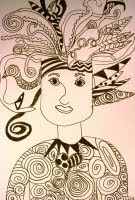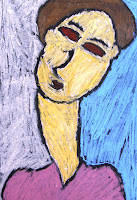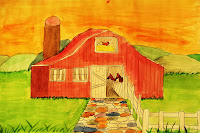I'll be teaching sixth grade next week. I have five sixth grade classes and that means, whatever project I begin, I better like it because I'll be repeating it over and over and over...
But this burst of creative energy won't help you until I post my lessons and I can't post my lessons until I've done the lessons! But don't worry. I'll post them as soon as they are finished. In the meantime, take my advice from lessons that are tried and true. Here are my favorites:
Sixth Grade
 Typically, I begin the year with a line drawing. One of my absolute favorites is the Wild Hair Line Drawing. Kids really get into this one and I like it because of the easy prep. Like most line drawings, removing the project from the child requires precise timing. To soon and they aren't done, too late and the child might get bored/get silly/decide he's too cool for sixth grade art/or any other imaginable scenario that results in a mess of scratchy lines.
Typically, I begin the year with a line drawing. One of my absolute favorites is the Wild Hair Line Drawing. Kids really get into this one and I like it because of the easy prep. Like most line drawings, removing the project from the child requires precise timing. To soon and they aren't done, too late and the child might get bored/get silly/decide he's too cool for sixth grade art/or any other imaginable scenario that results in a mess of scratchy lines.It's a fine line in sixth grade, so my advice to you is to have lots of pattern examples on the white board and show them how to make them.
Time: Depends. Usually one-60 minute class, but it might take some kids longer.
Supplies: 12" x 18" white drawing paper (see list under "Art Organization" in the menu bar.), black fine tip marker.
 It's always fun to do a self-portrait at the beginning of the year, but by sixth grade, the novelty of drawing one's self is wearing thin. So here's a fantastic alternative: Modigliani Self Portraits. Not only do they learn a little bit about Modigliani, but the process for drawing his faces is fail proof. I have to thank Kathy at Art Project for Kids for this one. It's a real star.
It's always fun to do a self-portrait at the beginning of the year, but by sixth grade, the novelty of drawing one's self is wearing thin. So here's a fantastic alternative: Modigliani Self Portraits. Not only do they learn a little bit about Modigliani, but the process for drawing his faces is fail proof. I have to thank Kathy at Art Project for Kids for this one. It's a real star.Time: Two 60-minute classes
Supplies: 12" x 18" black drawing paper, light colored oil pastel (white, yellow, etc), ruler and pencil, oil pastels in a variety of colors (make sure to have enough flesh tone)
 I'm going to list one more, as this one takes 4-5 sessions. Of course, the smaller the class, the easier it is to teach and the faster the kids will complete the project. If you have over 30 kids in your class (you have my sympathies) and you have no help, it will be a bit of a challenge. Rural Barns and Farms is an exciting lessons because the kids will not believe the results. Even I couldn't believe how well they turned out. They learn a ton of skills and it's a fantastic way to integrate math into an art curriculum. And it's not just about math, tons of watercolor techniques are used here.
I'm going to list one more, as this one takes 4-5 sessions. Of course, the smaller the class, the easier it is to teach and the faster the kids will complete the project. If you have over 30 kids in your class (you have my sympathies) and you have no help, it will be a bit of a challenge. Rural Barns and Farms is an exciting lessons because the kids will not believe the results. Even I couldn't believe how well they turned out. They learn a ton of skills and it's a fantastic way to integrate math into an art curriculum. And it's not just about math, tons of watercolor techniques are used here.For a full tutorial, consider purchasing my new "Architecture Made Easy" PDF. It's worth it!
Time: 4-5 Sixty-minute classes
Supplies: 12" x 18" watercolors paper (if you don't have watercolor, regular white paper is fine. This is the only project where regular paper just might work out better, so don't stress), pencil, eraser, ruler and template, watercolor paints, brushes and colored pencils.
So there you have it. Three fantastic projects that will get you to the end of October. Good luck and love up those sixth graders: next year? Junior High!

I do crazy hair day! LOVE IT!
ReplyDeleteI love the rural barns and farms example, this would be a perfect project to tie in with Autumn and harvest!
ReplyDeleteI really enjoy visiting, thank you!